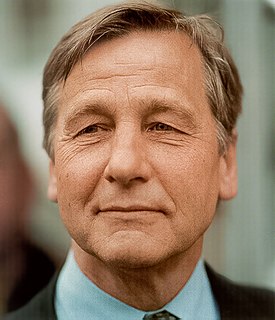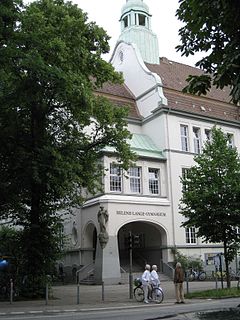
North Rhine-Westphalia, commonly shortened to NRW, is a German state (Land) in Western Germany. With more than 17.9 million inhabitants, it is the most populous state of Germany. Covering an area of 34,084 square kilometres (13,160 sq mi), it is the fourth-largest German state by size. Apart from the city-states, it is also the most densely populated state in Germany.

Dortmund is the third-largest city in North Rhine-Westphalia after Cologne and Düsseldorf, and the eighth-largest city of Germany, with a population of 588,250 inhabitants as of 2021. It is the largest city of the Ruhr, Germany's largest urban area with some 5.1 million inhabitants, as well as the largest city of Westphalia. On the Emscher and Ruhr rivers, it lies in the Rhine-Ruhr Metropolitan Region and is considered the administrative, commercial, and cultural center of the eastern Ruhr. Dortmund is the second-largest city in the Low German dialect area after Hamburg.

Hamm is a city in North Rhine-Westphalia, Germany. It is located in the northeastern part of the Ruhr area. As of 2016 its population was 179,397. The city is situated between the A1 motorway and A2 motorway. Hamm railway station is an important hub for rail transport and renowned for its distinctive station building.

Menden is a city in the district Märkischer Kreis, in North Rhine-Westphalia, Germany. It is located at the north end of the Sauerland near the Ruhr river.

Kerpen is the most populated town in the Rhein-Erft-Kreis. It is located about 20 kilometres southwest from Cologne.

Barntrup is a town in the Lippe district of North Rhine-Westphalia, Germany. It has an area of 59.46 km² and 8,501 inhabitants (2019). It lies 40 km east from Bielefeld and 9 km west from Bad Pyrmont at the east border of NRW to Lower Saxony.

Wolfgang Clement was a German politician and a member of the Social Democratic Party of Germany (SPD). He was the 7th Minister President of North Rhine-Westphalia from 27 May 1998 to 22 October 2002 and Federal Minister of Economics and Labour from 2002 to 2005. He was an Honorary Member of the International Raoul Wallenberg Foundation.

Goethe-Gymnasium is a gymnasium named after notable Frankfurt native Johann Wolfgang von Goethe (1749–1832). It is situated in the Westend of the city of Frankfurt am Main in Germany, near the Hauptbahnhof.

Euskirchen is a town in North Rhine-Westphalia, Germany, capital of the district Euskirchen. While Euskirchen resembles a modern shopping town, it also has a history dating back over 700 years, having been granted town status in 1302. As of December 2007, it had a population of 55,446. Its local football club is called TSC Euskirchen.

Werne an der Lippe is a town in the Federal state of North Rhine-Westphalia in the Unna district in Germany. It is located on the southern edge of the Münsterland region near the Ruhrgebiet. The population of Werne is about 32,000.

Lünen is a city in North Rhine-Westphalia, Germany. It is located north of Dortmund, on both banks of the River Lippe. It is the largest town of the Unna district and part of the Ruhr Area.

Olsberg is a town in the Hochsauerland district, in North Rhine-Westphalia, Germany.

Selm is a town in the district of Unna, in North Rhine-Westphalia, Germany. It is situated approximately 20 kilometers north of Dortmund and 25 kilometers west of Hamm.
The Humboldtschule is one of two Gymnasiums, besides the Kaiserin-Friedrich-Gymnasium (KFG), in Bad Homburg vor der Höhe, Hesse, Germany.

Christian Wolfgang Lindner is a German politician who has led the liberal Free Democratic Party (FDP) since 2013. He has been a Member of the Bundestag (MdB) for North Rhine-Westphalia since 2017, previously holding a seat from 2009 until 2012.

The Helene Lange Gymnasium (HLG) is a public gymnasium in the city of Hamburg, Germany. It was founded in 1910 as Höhere Mädchenschule, and after the passing of the mixed-sex education bill in 1969, it became accessible to boys in 1970. In that same year the school also offered its first bilingual program in German and English, effectively becoming the first bilingual Gymnasium in Hamburg.

Johann-Wolfgang-von-Goethe-Gymnasium Chemnitz is a public secondary school in Chemnitz, Saxony, Germany, for grades 5–12. It is one of seven secondary schools operating in Chemnitz.

Stadtgymnasium Detmold is a Gymnasium in Detmold in the German state of North Rhine-Westphalia. Founded in 1830, Stadtgymnasium Detmold is the second oldest Gymnasium in Detmold.

Höhere Mädchenschule or Höhere Töchterschule were names of historic schools for the higher education of girls in German-speaking countries between the beginning of the 19th century and 1908. The names may mean higher education, but also education of girls of the upper classes. Some early institutions of higher education for girls were called Lyceum, while the term Gymnasium was first used only for boys' schools.

Michaela Marion Noll is a German lawyer and politician of the Christian Democratic Union (CDU) who served as a member of the Bundestag from the state of North Rhine-Westphalia from 2002 until 2021.




















